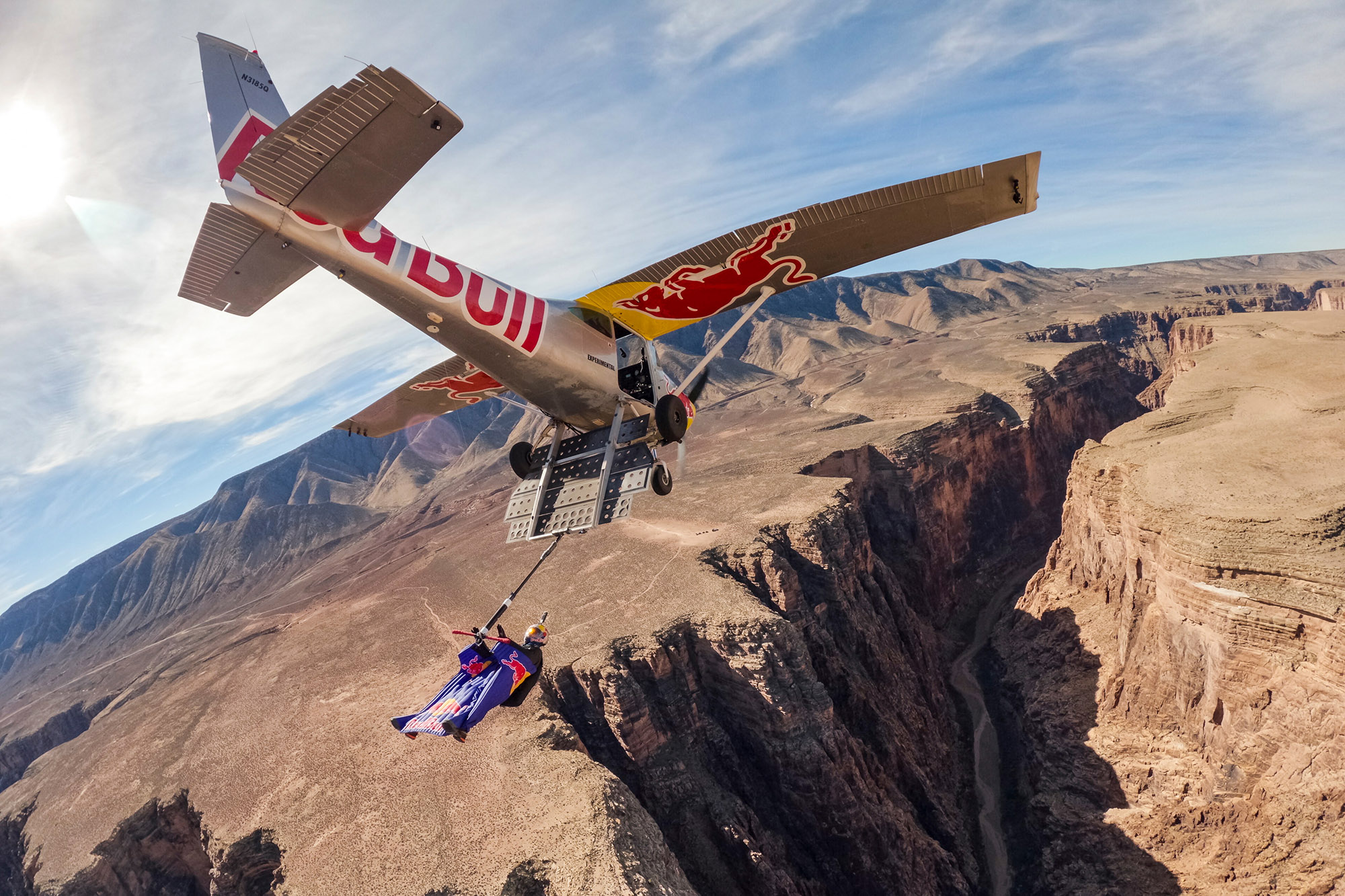Red Bull Skydive Team member Max Manow has redefined the boundaries of aerial adventure in a stunning world-first. Over the dramatic landscapes of the Little Colorado River Tribal Park, Navajo Nation – a side arm of Arizona’s iconic Grand Canyon – the German skydiver leapt from a helicopter, latched onto a nosediving plane in mid-air, and ascended out of Hell Hole Bend canyon.
From there, he embarked on what he calls his “endless skydive,” an achievement that is as daring as it is unprecedented.

Highlights
- The Feat: Manow leapt from a helicopter, tailed a moving plane, and attached himself to it with a custom-designed hook, allowing him to be towed in his wingsuit out of the canyon before releasing into freefall.
- The Innovation: This marks the first time a skydiver has demonstrated the ability to continuously skydive without landing to repack a parachute.
- The Equipment: Manow used a specially modified wingsuit and harness, while the Cessna 182 plane was equipped with an airbrake and hook system.
- The Vision: “In theory, I could repeat the process over and over again – an endless skydive,” said Manow, hinting at how this could revolutionise the sport.

Deep Dive
Manow’s unprecedented flight began at 10,000 feet above Arizona’s dramatic Hell Hole Bend canyon. After exiting a helicopter, he manoeuvred his wingsuit to close the gap with a nosediving Cessna 182, piloted by Red Bull Air Force legend Luke Aikins.
Precision was key: as the plane descended, Manow attached himself to a hook on the aircraft, allowing him to ascend back to a safe altitude of 2,500 feet before releasing into another freefall.
“It’s all about trust,” Manow explained. “The first big challenge was to get together with Luke and meet him in the air. The first time I was able to attach to the handle, it was so difficult. The airflow was very different, and it was throwing me around. I had to learn a lot of different ways of flying.”

The logistics required months of preparation. Manow spent five months training, including sessions in a Stockholm wind tunnel, to master the techniques needed for mid-air connection. Meanwhile, Aikins modified his aircraft to ensure the feat was safe and repeatable.
The Little Colorado River Tribal Park, nestled in the Navajo Nation, provided a stunning yet unforgiving backdrop for this endeavour. Hell Hole Bend’s dimensions – just 240 metres wide and 427 metres deep – left no room for error. With glide angles of 1:2.2 and speeds of up to 150 kilometres per hour during the approach, every moment demanded precision and trust.
“What makes this project unique is that we are taking things that exist but are not meant to fly together, like wingsuits and planes,” said Aikins. “When Max called and asked if I could tow him on a plane, I thought he might be a little crazy.”

Once connected to the plane, Manow spent three minutes being towed out of the canyon, ascending at a rate of 500 feet per minute. The custom rigging included an airbrake controlled via a winch inside the cockpit and a rope housed in a carbon fibre tube to provide stability in turbulent air.
“We had radio communication, so I was always updating him on altitude and position,” Aikins added. “He was on his back and couldn’t see where we were going, so he had to have so much trust that I was going to take him to the right spot.”
Manow’s “endless skydive” opens the door to a new vision of skydiving, where athletes could remain airborne without ever needing to land. Reflecting on the experience, Manow said: “Who knows where this will take the future of the sport?”

The project also highlighted the importance of collaboration and innovation. The helicopter supporting the mission was piloted by Aaron Fitzgerald of the Red Bull Air Force, with aerial footage captured by Red Bull Skydive Team member Marco Fürst.
Key Stats from the Flight
- Helicopter exit altitude: 10,000 feet (3,048 metres)
- Climb rate while attached to the plane: 500 feet/min (2.54 m/s)
- Speed flying alongside the plane before connection: ~80 knots (41 m/s)
- Dimensions of Hell Hole Bend: 240 metres wide, 427 metres deep (Red Bull Content Pool)








You must be logged in to post a comment.